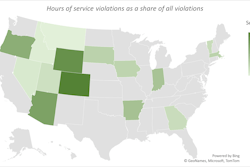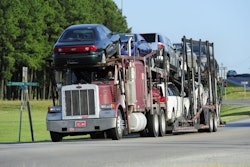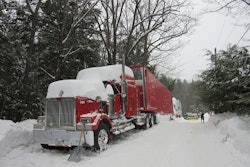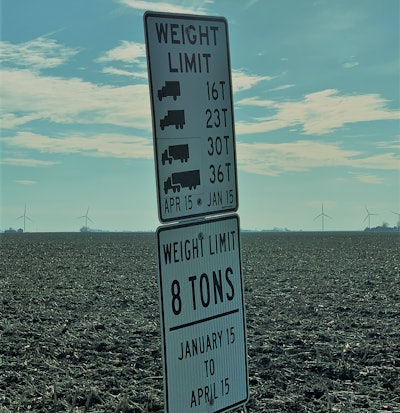 Get caught unawares about winter weight restrictions along county and township roads in the more northern states, and the penalty could be a huge fine.
Get caught unawares about winter weight restrictions along county and township roads in the more northern states, and the penalty could be a huge fine.
It’s like a bad riddle trying to unravel the winter frost laws and weight restrictions in the more northern states. The trucker who hasn’t encountered winter up here may not have any idea that the route planned may be restricted and require a permit or permission from local authorities for what would, in another season, be a legal load.
This is especially the case in rural communities and townships. Winter weight restrictions there are aimed at preserving roads built with old paving technology over already generally unstable ground.
If you think you’ll never have to deal with this, think again. Small municipalities and their businesses, new construction sites, outlying farms and agricultural suppliers all keep growing. Large solar and wind energy projects, generating plenty of freight, pop up at an ever-increasing rate.
Winter restrictions can be so complicated that a trucker living on such a route might have a hard time explaining the restrictions that apply right in front of his house. The three-mile stretch of road that I live on in Illinois is often used as a truck route. For much of the year, the weight limit for about two miles of it is 36 tons, or 72,000 lbs., for five axles. When the restrictions are announced (usually between January 15-March 15) the weight limit drops to 16,000 lbs. for the portion of the road in my county. Yet 500 feet from my house, at the county line, the winter weight limit changes to 7,000 lbs. per axle.

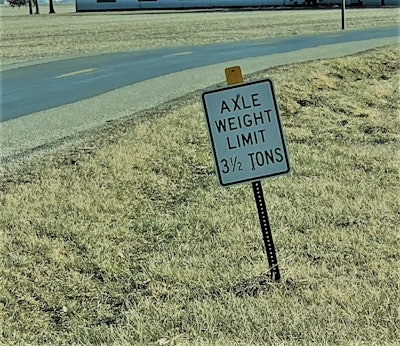 If you need to run a township or county road to get to a customer during winter periods of weight restrictions, it's often wise to contact the township road commissioner or the county sheriff for details on the best approved route.
If you need to run a township or county road to get to a customer during winter periods of weight restrictions, it's often wise to contact the township road commissioner or the county sheriff for details on the best approved route.
It gets worse in Michigan and certain other states. Some restrictions might include a speed limit reduction that's not even posted clearly.
Confused yet?
It’s advisable to learn the names of the county and town or township in question when trying to search the internet for the appropriate contact to answer questions. That in itself can be a tough nut to crack, given the number of local government bodies. As the chart here shows, Illinois alone has nearly 7,000 such bodies. (Here's a place you might start for "frost laws" that exist in the U.S. and Canada.)
Top 5 states, number of local governments
 Source: U.S. census of governments
Source: U.S. census of governments
This time last year, my friend Bill Ater was hauling out of Texas to a construction site here in the Midwest and needed help determining whether he’d be able to get to the place, given winter weight restrictions. When I pulled up the satellite view of the address he’d been given, it showed nothing more than open field.
I started with a call to the county sheriff’s office to ask about the route into the location -- the deputy wasn’t even sure how to answer. I gleaned a contact, though, for the township road commissioner in that area. Bill later got the correct restriction information for the road into the site, permission from the commissioner, and a warm thank-you from the sheriff’s office and the commissioner.
My neighbor Jeff is a local road commissioner, overseeing some of the winter-restricted roads around here. As was the case for Bill, Jeff told me he tries to be reasonable. He has seen too many trucking companies abuse temporary privileges granted, though, veering off-route and taking the most direct path to a heavier road, rather than the one they’ve been instructed to haul on.
Bill’s case reminded me of a chance I took in Pekin, Illinois, in 2018. I was making a local delivery and navigated down what looked to be the most direct route to the store. Yes, there was a city sign indicating this was not a through-route, but since I was delivering, I believed I was in the right.
The city’s ordinance online read as if I should be able to use the street. The problem was I drove through part of a city park district that turned out to be an independent government with its own jurisdiction and ordinances.
I was ticketed by the park police and the fine was to be $150. I called the city manager’s office and Pekin police and streets departments trying wrap my mind around how, within a municipality, there could be a separate government that could do whatever it wished?
I disputed the charges in court and they were dismissed, though only over a technicality, the judge said. He cautioned: “You were lucky today.” His implied directive: Don’t press your luck in the future.
If there’s any question about the legality of your truck on a route into a northern town this time of year, call the local police or sheriff for advice. And keep in mind, we’re not talking about oversize or overweight loads, generally speaking. Your dispatcher, customer or broker likely has no idea that "frost laws" could stop you and cost you time or a huge fine. My township commissioner Jeff has fined drivers as much as $5,000 for being 70,000 lbs. over the winter weight limit after they were warned, ignored the signs and traveled off the approved route.
This is one skill where technology doesn't always have the answer, even when it might appear to. Beware what your GPS says and question everything -- before you end up in front of a judge.

